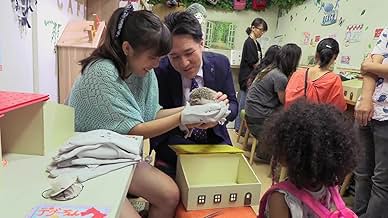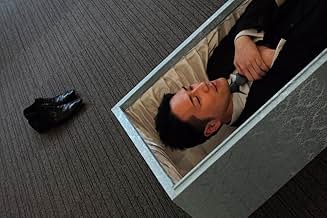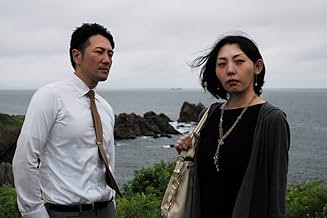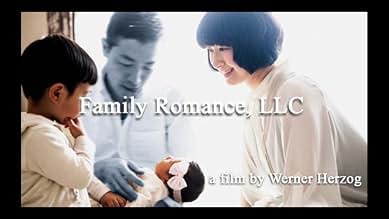IMDb RATING
6.7/10
3.2K
YOUR RATING
A man is hired to impersonate the missing father of a young girl.A man is hired to impersonate the missing father of a young girl.A man is hired to impersonate the missing father of a young girl.
- Awards
- 1 nomination total
Yuichi Ishii
- Ishii Yuichi
- (as Ishii Yuichi)
Mahiro Tanimoto
- Mahiro
- (as Mahiro)
- Director
- Writer
- All cast & crew
- Production, box office & more at IMDbPro
Featured reviews
An interpretation of the deceptive world we increasingly inhabit, as an agency provides surrogates for just about anything you fancy. Performed as a convincing faux documentary in Japan - robots next. Imagine how deplorable and low the human race will be able to sink then and you'll never be arrested.
It's been a while since I haven't heard about Werner Herzog. And now, this. Do Japanese people hire fake fathers or other friends? I wouldn't know. Do they travel long distances to consult with an oracle woman? I wouldn't know either. Is there an emergent industry of pretending you're dead, in order to see what it's like? How could I know? Are robots likely to take over from humans in ways we can't fathom yet? For sure. Can we pretend to fight without weapons? Absolutely. Do we need to save face in various situations? You can bet on it. Would we hire someone to take the blame and prosternate to the boss's feet instead of us? Don't answer no; you'd be lying. Stark interiors, formal attitudes, rigid dialogues- and a world of turmoil within. Is it reality? Is it a nearing, ominous future? Is it Japan? Is it not? Who cares, it's a good film. Who would have thought in 2019 that we would be quarantined globally in 2021? And yes, somewhere in south-east Asia I witnessed a situation in which two young men fell on their knees in front of an older guy- presumably their employer- and showed their deepest remorse and practically kissed his feet in public; they didn't stand up before the man touched their shoulders. Not a scene for European eyes.
...you will not understand how 'real' this film is. It may appear banal or even boring if you don't appreciate
how sensitive the Japanese are. For a society and culture as creative as Japan, the idea you would like to have someone who could 'fill in the gaps' in your life is quite possible. Werner Herzog was apparently influenced by an article in the NYT. I haven't read the article but I will try to find it, it is probably as interesting as the film. Wonderful images and roles.
BTW, if you haven't visited Japan, put it on you list of things to do, if possible.
BTW, if you haven't visited Japan, put it on you list of things to do, if possible.
I'm gonna be brief here: everyone could have done a documentary about this topic. We're talking about a japanese agency specialized in renting substitutes for dead family members!
Herzog gives us coordinates and help us to ask the right questions to understand our apparently weird world. What is the role of the illusion? What connection does it have with the robotics and cinema? Is it totally evil?
There's no judgment in the director's eye. Only representation, critical look and, of course, illusion.
Yuichi Ishii runs a rental family service called Family Romance, offering clients the chance to hire people to act as their spouses, friends or family. He and his stable of actors fill the gaps in lonely people's lives. One day, Ishii is contracted to act as the father of a girl named Mahiro. The two become close, though Ishii begins to doubt his own reality, and his profession: to quote Werner Herzog: "the paradoxical situation is that although everything is performance, everything is a lie, everything is fabricated and acted, there is one thing always authentic, and that's emotions."
Herzog's 'Family Romance, LLC' is a moving drama, treading the line between feature film and documentary. Shot by Herzog himself, using a handheld camera, the film postulates that performance, artifice, is rife in society, that we are but, to paraphrase Shakespeare, "poor players strutting and fretting our hours upon the stage."
For many years, Herzog has spoken of "ecstatic truth," by which he means a storyteller, through fabrication, can reach a deeper, transcendent level of truth, going beyond mere factual accuracy. Essentially, it's a truth transcending the mundane, reaching into the mysterious, elusive realms of imagination and stylization. In other words, a lie that reveals truth, that is more authentic than reality itself. This is an undercurrent in 'Family Romance, LLC,' forming the foundation of Ishii and Mahiro's relationship.
To quote Herzog, "the girl lies to her 'father', who lies to be her father. She's lying to him as well, but her emotions for him are authentic." Weaves of ecstatic truth run throughout the tapestry of the film, as does the notion that we are all performers. This is heightened by the casting of Ishii as himself, as he, in reality, really runs a company called Family Romance, which actually provide the services mentioned above.
Throughout the film, Herzog invites viewers to question the veracity of our experiences, comparing us to robotic fish in a tank; endlessly swimming in an inescapable compound. Further, he highlights the loneliness of many in contemporary Japan, a land bustling with people where many feel isolated and alone.
According to CNN, "across Japan, nearly 1.5 million people have withdrawn from society, leading reclusive lives largely confined within the walls of their home... These are Japan's hikikomori, or shut-ins, defined by the government as people who have been isolated for at least six months." Japan faces an isolation crisis, and Herzog's film shows how Ishii's company breaks the dark spell of loneliness, how, in the words of Ishii, they "create illusions to make the lives of (their) clients better."
It makes for poignant drama. Watching young Mahiro form a relationship with a man she assumes to be her real father, and knowing that their relationship cannot last, is devastating. There is an improvisational, informal feeling to the film, so one really believes in their relationship, and is invested in their characters. While there are moments of humour throughout- such as when a mime performs a brilliant routine with a mobile phone- it is primarily a touching film, exposing deep truths, tugging at the heartstrings.
The film also shows other cases Ishii works on, such as a lottery winner who wants to re-experience the high of the win, or a man who wants someone else to take credit for a mistake he made at a train station. These are generally more comedic in tone, though no less believable, adding to Herzog's authentic depiction of life in Japan.
Herzog's handheld cinematography contributes to the film's realistic feeling. It is intimate, getting in close to the characters. Viewers feel like voyeurs, peeking into the lives of Ishii and Mahiro. At times, the visuals take on a dreamlike aspect, making Japan feel unreal, like a figment of the imagination. Ernst Reijseger's elegiac score adds to this feeling of unreality, complementing Herzog's imagery, while his and Sean Scannell's editing is astute. Reportedly, Herzog captured over 300 hours of film with Ishii; to cut it down to a coherent 90 minutes is an effort deserving applause.
As are the performances from the cast, all of whom are not primarily actors, and most of whom had not acted before, and have not done since. Yuichi Ishii, as a version of himself, is terrific. He has an inherent emotional intelligence and decency, which is evident on screen, making him a compelling character. Mahiro Tanimoto, playing Mahiro, is similarly excellent. A natural actress, she brings a vulnerability to the part that is most affecting, and is never anything less than believable. Her relationship with Ishii feels remarkably real, and they work wonderfully together. In addition, Miki Fujimaki does strong work as Mahiro's mother, and the rest of the amateur cast cannot be faulted.
Werner Herzog's 'Family Romance, LLC' blurs the line between fact and fiction, as his films often do. A touching, heartbreaking drama, it movingly examines human nature, loneliness and interpersonal relationships. It also ponders the meaning of truth, and how performance impacts our daily lives. Featuring striking cinematography and a powerful score, and led by two remarkably real performances from Yuichi Ishii and Mahiro Tanimoto, it is- much like its director- original, fascinating and unique.
Herzog's 'Family Romance, LLC' is a moving drama, treading the line between feature film and documentary. Shot by Herzog himself, using a handheld camera, the film postulates that performance, artifice, is rife in society, that we are but, to paraphrase Shakespeare, "poor players strutting and fretting our hours upon the stage."
For many years, Herzog has spoken of "ecstatic truth," by which he means a storyteller, through fabrication, can reach a deeper, transcendent level of truth, going beyond mere factual accuracy. Essentially, it's a truth transcending the mundane, reaching into the mysterious, elusive realms of imagination and stylization. In other words, a lie that reveals truth, that is more authentic than reality itself. This is an undercurrent in 'Family Romance, LLC,' forming the foundation of Ishii and Mahiro's relationship.
To quote Herzog, "the girl lies to her 'father', who lies to be her father. She's lying to him as well, but her emotions for him are authentic." Weaves of ecstatic truth run throughout the tapestry of the film, as does the notion that we are all performers. This is heightened by the casting of Ishii as himself, as he, in reality, really runs a company called Family Romance, which actually provide the services mentioned above.
Throughout the film, Herzog invites viewers to question the veracity of our experiences, comparing us to robotic fish in a tank; endlessly swimming in an inescapable compound. Further, he highlights the loneliness of many in contemporary Japan, a land bustling with people where many feel isolated and alone.
According to CNN, "across Japan, nearly 1.5 million people have withdrawn from society, leading reclusive lives largely confined within the walls of their home... These are Japan's hikikomori, or shut-ins, defined by the government as people who have been isolated for at least six months." Japan faces an isolation crisis, and Herzog's film shows how Ishii's company breaks the dark spell of loneliness, how, in the words of Ishii, they "create illusions to make the lives of (their) clients better."
It makes for poignant drama. Watching young Mahiro form a relationship with a man she assumes to be her real father, and knowing that their relationship cannot last, is devastating. There is an improvisational, informal feeling to the film, so one really believes in their relationship, and is invested in their characters. While there are moments of humour throughout- such as when a mime performs a brilliant routine with a mobile phone- it is primarily a touching film, exposing deep truths, tugging at the heartstrings.
The film also shows other cases Ishii works on, such as a lottery winner who wants to re-experience the high of the win, or a man who wants someone else to take credit for a mistake he made at a train station. These are generally more comedic in tone, though no less believable, adding to Herzog's authentic depiction of life in Japan.
Herzog's handheld cinematography contributes to the film's realistic feeling. It is intimate, getting in close to the characters. Viewers feel like voyeurs, peeking into the lives of Ishii and Mahiro. At times, the visuals take on a dreamlike aspect, making Japan feel unreal, like a figment of the imagination. Ernst Reijseger's elegiac score adds to this feeling of unreality, complementing Herzog's imagery, while his and Sean Scannell's editing is astute. Reportedly, Herzog captured over 300 hours of film with Ishii; to cut it down to a coherent 90 minutes is an effort deserving applause.
As are the performances from the cast, all of whom are not primarily actors, and most of whom had not acted before, and have not done since. Yuichi Ishii, as a version of himself, is terrific. He has an inherent emotional intelligence and decency, which is evident on screen, making him a compelling character. Mahiro Tanimoto, playing Mahiro, is similarly excellent. A natural actress, she brings a vulnerability to the part that is most affecting, and is never anything less than believable. Her relationship with Ishii feels remarkably real, and they work wonderfully together. In addition, Miki Fujimaki does strong work as Mahiro's mother, and the rest of the amateur cast cannot be faulted.
Werner Herzog's 'Family Romance, LLC' blurs the line between fact and fiction, as his films often do. A touching, heartbreaking drama, it movingly examines human nature, loneliness and interpersonal relationships. It also ponders the meaning of truth, and how performance impacts our daily lives. Featuring striking cinematography and a powerful score, and led by two remarkably real performances from Yuichi Ishii and Mahiro Tanimoto, it is- much like its director- original, fascinating and unique.
Did you know
- TriviaThe scene filmed at the station where Ishii Yuichi is reprimanded was filmed in one shot and the team dispersed after filming because they were filming without permission and the Security Team was coming to arrest them.
- Alternate versionsThe MUBI streaming (internet) version adds an 5' introduction by Herzog, and a 16' post interview with him by MUBI's Daniel Kasman.
- ConnectionsReferenced in Film Junk Podcast: Episode 758: Cloud Atlas (2020)
Details
- Release date
- Country of origin
- Language
- Also known as
- Family Romance, LLC.
- Filming locations
- Yoyogi Park, Shibuya, Tokyo, Japan(Yoyogi koen)
- Production company
- See more company credits at IMDbPro
Box office
- Gross worldwide
- $3,126
- Runtime
- 1 hour, 29 minutes
- Color
Contribute to this page
Suggest an edit or add missing content




















